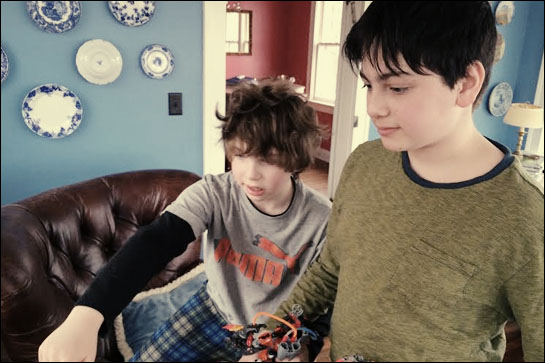
Today I sifted through drafts of posts I didn’t publish. This is from 2011. The picture up top caught my eye, so I read the post.
Last Friday I spent the day in bed. Well, first I got out of bed, had the kids do chores, and then made breakfast for the Farmer and the kids. But then I went back to bed.
There are only two days a week when we are at home all day. No driving. Friday was one of those days. Usually I force myself to look high-functioning, but usually the Farmer is around all day, and I confess to be influenced by his presence. I don’t want him to see me sleeping all day.
But he had gone to the accountant to do his taxes. So I slept.
I slept from 8am to 1pm. I woke up and went downstairs to see what the kids were doing. They were doing fine, I think. It was sort of a party.
I can’t tell if I’m a crazy, neglectful parent for sleeping or if the kids are resourceful and fun.
It bothers me that the crazy parents don’t know they are crazy. It’s clear to me that very few people know when they are out of their minds in a given area. For example, people who have terrible social skills don’t know they are terrible, because that’s part of the problem. They don’t notice that they are the problem.
The post is cut off by a note from Jay, my editor at that time: “Be more useful.”
Ten years later, as a reader of the post, I find it incredibly useful. I can see that I need scaffolding in order to be my best self. I knew what a good parent does, but unless I had some external forces pushing me in that direction, I did the least I could get away with. Not because I was a terrible person, but because I was overwhelmed from sensory input and tired from poor executive function.
Not a lot has changed since then.
But I have read a lot about parenting since 2011. I know what researchers define as good parenting: emotional availability. It’s not just being present. It’s being present and totally checked in. Not necessarily talking but being ready and willing to talk. Or listen. And care. So watching a soccer game doesn’t necessarily count. Practicing cello doesn’t necessarily count. Making dinner doesn’t necessarily count. What counts is what the child believes you will do if the child wants emotional attention at that second.
Would it have counted that my kids could have come up to my bed and woken me up?
Am I emotionally available right now because I’m sitting next to my son typing? Or am I too consumed with the question of how to use the word woken? So many times I have been stuck on a question like the nuance of past imperfect and can’t get my brain to answer a “Hey, Mom…”
What I really want to do is to be able to shift quickly when the boys want my attention. It’s okay to be in bed all morning, but I need to get out if they need me. It’s okay to obsess over “awoken” versus “waked,” as long as I can stop my brain immediately when my son speaks.
Being emotionally available is hard. It takes a lot of practice. I wish someone had told me to start practicing when they told me to start taking prenatal pills.
The post Key skill for homeschooling parents: emotional availability appeared first on Penelope Trunk Education.
